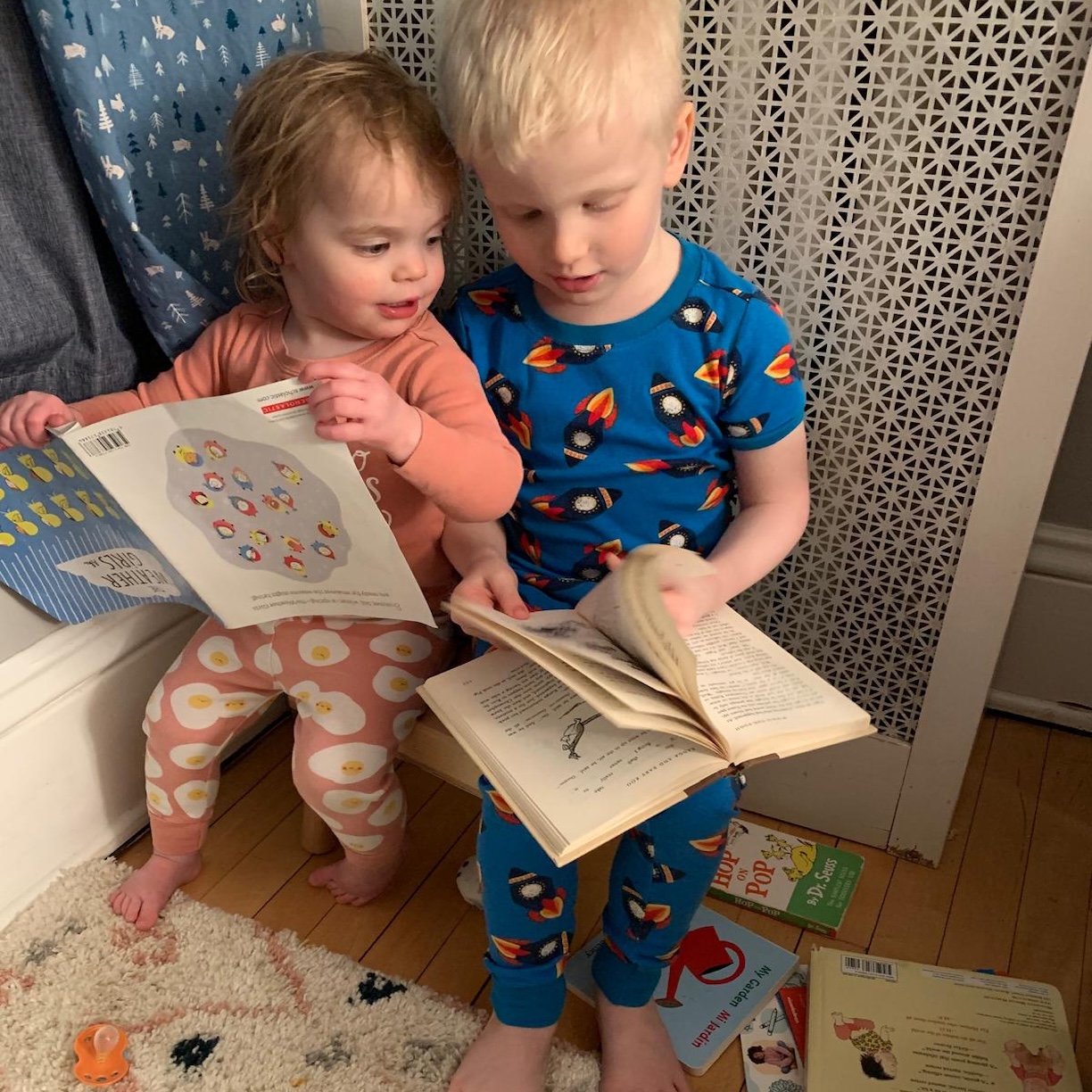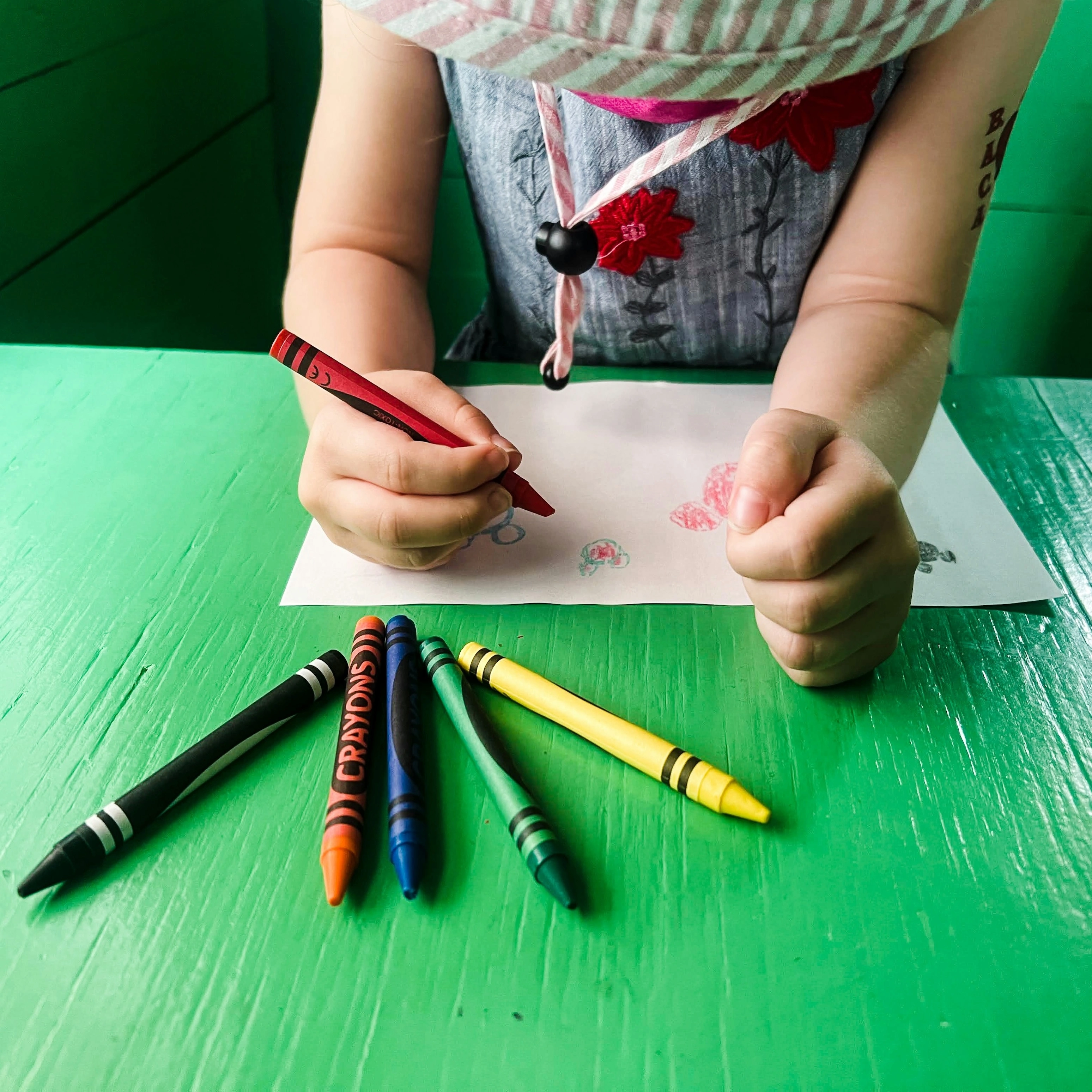


Turn screentime into storytime.

It’s happening again. Trees have leaves. Flowers are blooming. Birds are singing. Leaf blowers are roaring across the Midwest at the decibel of a jet engine. And we have just now realized the elementary school’s summer program is a full FIVE weeks shorter than actual summer break and daycare is closed for a full week in July for “cleaning.” No, the weeks do not overlap. Yes, that seems excessive for cleaning. No, we do not have a backup childcare plan. Yes, we were told about this and could have planned ahead. Stop asking!
So here I am, staring down 15 weeks of summer vacation, a little over one-third of which will be spent hunched over my laptop yelling at my kids that I’ll be with them in five minutes while frantically trying to finish an email, or, *ahem*, a blog post… Meanwhile, as screens become my most reliable ally in managing the chaos, articles keep filling my newsfeed saying how detrimental screentime is for kiddos. What’s a working mom to do?
To add to my confusion, I attempted to hunt down the citation to support the official screentime recommendation limits from the American Academy of Pediatrics for this very blog post, only to find that the AAP has removed its time-specific recommendations by age. While they still recommend one hour or less for children ages 2 to 5, their (quite wordy) recommendations for older and younger children include no specific time limits, instead emphasizing balance with other activities and quality over quantity and coviewing whenever possible.
To be honest, I think it’s well past time to bring some nuance into the screentime discussion. That being said, if it involves me watching Blippi, I’m out. Screentime is the time that I work, make dinner, clean up dinner, you get the idea. So what’s a busy mom to do? I don’t claim to be an expert, but I have thought about this quite a bit. So here are some tips to help ease the mom guilt that comes from relying on screentime during summer break.
Not all screentime is created equal. And research actually backs this up. A recent National Geographic article summarizes the results of a 2022 study showing that meaningful screentime can actually have beneficial effects for kids. What is meaningful content? Honestly, it’s probably what you think it is. Think about screen activities with educational, social, or physical value and active versus passive content. Video games have been shown to improve hand-eye coordination and social skills. Watching a movie as a family or even siblings watching a show together is a shared social experience. Digital stories and educational games can help improve literacy and other academic skills. Rather than sticking rigidly to a specific number of minutes per day, try finding ways to weave meaningful screentime naturally into your everyday routine, for example, waiting to be seen at the pediatrician? Ready a digital story! Look at hockey scores together. Turn a passive experience into a meaningful interaction. Try to stay away from algorithms (I see you endless stream of YouTube videos) and instead encourage your kiddo to actively choose the content they are consuming.
Do you remember fighting over the remote with your little sister over summer break? I do! (And Boy Meets World was the objectively best choice.) These kinds of negotiations over a high value reward build important social skills that will serve your kiddos throughout their lives. So let your kids watch TV, but instead of isolating themselves to their own tablets, encourage them to choose a show to watch together.
Screens aren’t going anywhere. And phones and tablets are designed to provide little dopamine hits to keep you picking them up, which is probably why my phone tells me I pick it up 640 times per day. Every time you help your kid transition from screentime to another activity, you are teaching them to push back against this pleasure programming. That doesn’t mean the transition will always be easy. But the more they practice turning the tablet off and moving on to something else, the easier it will become.
Any life skill takes time to build. Have your kid practice turning off the screen before they even start tablet time. (This works especially well with my five-year-old.) Before your kid gets to turn on the tablet, practice telling them to turn it off and hand it back to you. Do it again two or three times before letting them have it. (It sounds dumb, but kids seem to have fun with it, and I swear it makes our transitions easier!)
I’m no stranger to screentime tantrums. If things get out of hand or a tablet or remote gets thrown, my kid loses screen privileges for the day. No yelling. No negotiating. No other punishment. Just “we’ll try again tomorrow!” A tantrum is a natural reaction when a young kid doesn’t get what they want. And you are showing a natural consequence by taking screentime away.
Don’t stress… Remember how mean parents were in the 80s and 90s? They didn’t acknowledge our feelings or give us choices! They yelled at us! We made our own Ramen noodles! They did their best and we turned out, like, mostly fine! Some days you might have the time and energy to bake cookies and build forts with your kids. Other days you might let the TV babysit while you prepare for your work presentation. This is life in the summer, and you’re probably not going to ruin your kids… or at least not in the way you expect—that’ll be a fun surprise for later in life.
We’re all doing our best here, and you’re doing a great job. Happy summer and hang in there!
© {YEAR}. All Rights Reserved.


